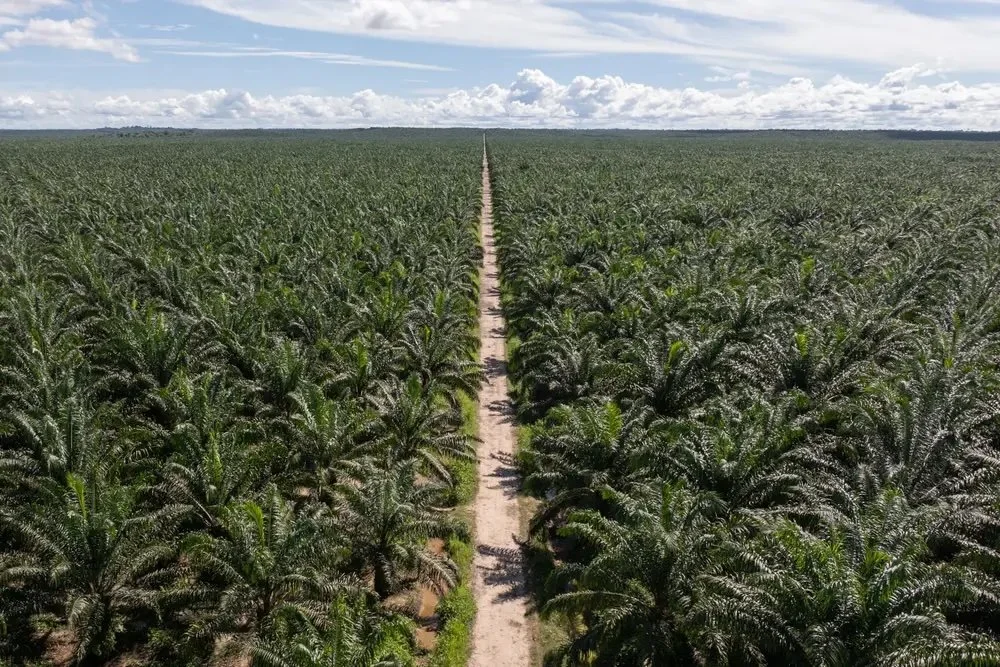A palm oil company, a group of US financiers, and the destruction of Peru's rainforest
December 2024
Two of the largest palm oil plantations in Peru are located on the west side of the Ucayali River, which flows from the Andes to the Amazon. From above, the surrounding landscape looks like stirred paint: a swirl of green amid inky lakes and brown rivers. Tibecocha, the larger of the two plantations, appears to have been etched into the jungle with a ruler and a straight razor. Its rectangular grid of roads extends over almost 8 miles and contains a million palm trees. The smaller property, Zanja Seca, is nearly the size of Manhattan.
Each year, these plantations generate about $50 million in revenue for the Ocho Sur group, whose palm oil has ended up in products ranging from Cheetos to Colgate toothpaste. The $160 million that the company's backers, primarily US venture capitalists and private equity funds, have spent on its operations represents the largest foreign investment in agriculture in the history of the Peruvian Amazon.
The palm industry got off the ground here thanks to US development programs designed to give farmers a money-making alternative to growing coca plants, the precursor to cocaine, and the US ambassador to Peru even paid a visit to Ocho Sur's properties last year. Ocho Sur's operations are now so vast, and it is such a dominant force in the region's economy, that locals refer to it simply as la empresa — "the company."
But the creation of the plantations came at a steep price. To make way for those industrial fields of palm trees, some 30,000 acres of rainforest were cut down, a swath of destruction that one Indigenous leader called an act of "eco-genocide." Biologists from Chicago's Field Museum have ranked the rugged mountains that rise west of the plantations "among the most diverse of all conservation areas in Peru." When the museum's team surveyed the region for three weeks in 2000, it tallied 1,600 species of plants, 71 species of mammals, and more than 500 species of birds. At least 28 species were new to science.
Since the 1960s, more than 13%of the original Amazonian rainforest has been cleared. Most of the destruction has been concentrated in Brazil, but Peru is second on the list. If the destruction continues, Thomas Lovejoy, a former biodiversity advisor to the World Bank, has argued that the Amazon could reach a tipping point and become too hot, dry, and fire-prone to remain a rainforest. Without the carbon-absorbing capacity of the Amazon, the world would face increasing temperatures and melting the ice caps, making cities as far away as Mumbai virtually unlivable.
Seeking to be a model of sustainable development, Ocho Sur has signed pacts with local communities to conserve the native ecosystem, and its polished English-language website features a slideshow of anteaters, sloths, and monkeys. The company has replaced its trucks and tractors with mules and water buffalo and has vowed not to expand its operations into standing forest. Over the past two years, Ocho Sur says, it has spent $3 million maintaining roads and building schools and medical clinics.
When the company's CEO, Michael Spoor, who joined Ocho Sur in 2019, talks about the company's accomplishments, he draws a sharp line between the Ocho Sur Group and whoever it was who first staked a claim in the virgin territory. "We came to Peru in 2016 and bought two farms in Ucayali at a public auction," he has said. "All that we have done, we have done without deforesting anything."
Documents I obtained from a criminal investigation into Ocho Sur — along with an exclusive trove of internal company emails, bank records, and spreadsheets covering eight years of plantation operations — tell a more complex story about the role of the company's founders in the original destruction of the rainforest. At its heart is an American businessman named Dennis Melka, who a Peruvian prosecutor has claimed is the ringleader of a "criminal organization" that passed mature plantations from one company his investors had bankrolled, United Oils, onto a second, Ocho Sur. After the transfer, I found, key personnel from United Oils remained in place — including Melka. Most importantly, prosecutors say that United Oils illegally cleared much of the plantation land, and that Ocho Sur, for all of its sustainable initiatives, is in many respects the same entity as its clear-cutting predecessor. Melka has not responded publicly to the prosecutors' allegations and did not respond to requests for comment.
Ocho Sur's links to deforestation have profound implications for businesses, consumers, and the environment — and what exactly counts as "sustainability" in the palm oil industry. The global market for palm oil, valued at more than $70 billion last year, is experiencing steady growth, driven by its use in products as varied as food, beverages, biofuels, and cosmetics. Last year, the European Union passed new regulations on deforestation that promised to be the strictest in the world. Companies like Ocho Sur are now racing to demonstrate that their plantations were not illegally deforested — or risk losing their share of the lucrative market. But it may not be that easy.
"Nearly everything they export has been illegally produced," argues Julia Urrunaga, who leads research in Peru for a Washington, DC-based environmental organization. "What needs to happen here is they need to be sanctioned, and they need to be ordered to reforest and leave."
Read the rest at Business Insider
Published in collaboration with the Food and Environment Reporting Network and the Pulitzer Center.
